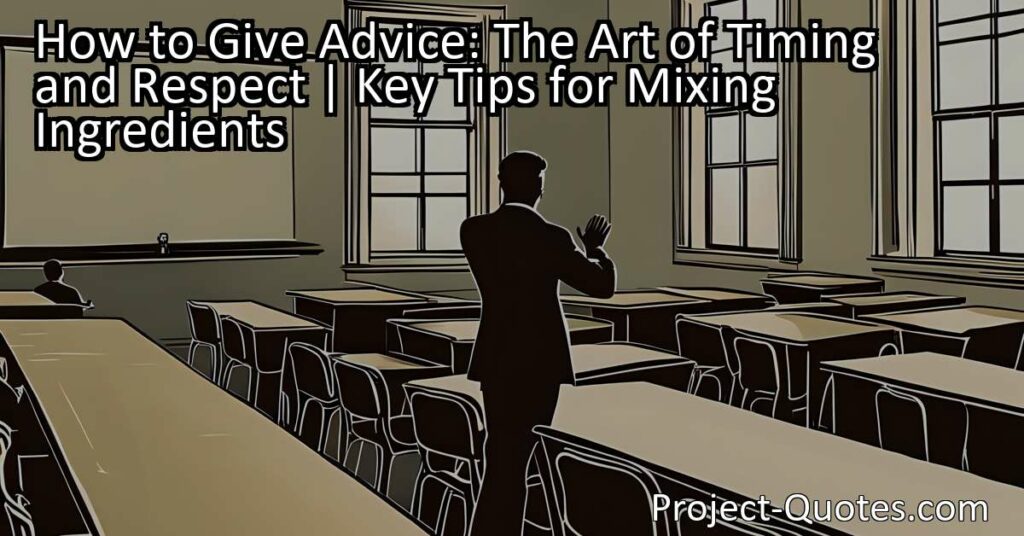Don’t give your advice before you are called upon.
Desiderius Erasmus
In the article “How to Give Advice: The Art of Timing and Respect,” the author compares giving advice to mixing ingredients in a recipe. Just like adding the right amount of each ingredient at the right time is crucial for a tasty cake, giving advice requires patience, listening well, and waiting for the right moment. By following these steps, we not only become helpful friends but also show respect for others’ feelings and efforts, strengthening our relationships.
Table of Contents
Meaning of Quote – Don’t give your advice before you are called upon.
“**Don’t give your advice before you are called upon.**” These words, spoken by the wise Desiderius Erasmus, hold a powerful message about when and how we should offer our thoughts and guidance to others. Imagine walking through a beautiful park, enjoying the birds singing and the gentle rustle of the leaves. Suddenly, you come across a friend who’s struggling to fly a kite. The kite twists and turns, never quite soaring into the sky. You’ve flown many kites in your time and know a trick or two, but hold that thought! Before you jump in with your helpful hints, let’s think about what Erasmus might say in this situation.
Erasmus, a brilliant scholar from a time long ago, suggested that giving advice is a bit like being a doctor. Doctors have a lot of knowledge about keeping people healthy, but they don’t just walk around telling everyone what to do to feel better. They wait until someone comes to them and asks for help. Now why would that be? It gives the person a chance to figure out what they want and shows respect for their ability to ask for help when they need it.
So, when you see someone like your friend with the kite, you might think, “I know how to fix that!” But maybe your friend wants to try figuring it out on their own. It’s a fun challenge, and making mistakes is part of learning and getting better at something. If you give advice without being asked, it could take away your friend’s chance to learn and feel proud of figuring it out.
There’s another side to this, too. Have you ever been in the middle of doing something cool or fun, and out of nowhere, someone starts telling you how you’re supposed to do it? It can feel a little frustrating, right? It’s like someone’s stepping into your adventure without an invitation. Erasmus thought it was crucial to wait for that invitation for someone to say, “Hey, can you help me with this?”
But let’s be honest, it feels good to help and to share what we know. So, what can you do? Instead of jumping in with advice, why not start by asking a question like, “Having trouble? Want a hand?” It’s a friendly way of offering help without assuming the other person wants it. If they say yes, then it’s your turn to shine with all your kite-flying expertise!
Offering advice at the right time can make a big difference. When someone asks for your advice, they’re ready to listen, and that means your advice will be more valuable to them. It’s a bit like giving someone a gift they’ve been hoping for, rather than a surprise present they’re not sure they want.
Now, what if you really, really want to help, but no one’s asking? There are still ways to give a gentle nudge that might lead them to ask for your help. For example, if your friend with the kite keeps getting it stuck in a tree, you might say something like, “I used to get my kite stuck too. I found a trick that worked well for me.” This might make your friend curious, and they might ask, “Oh, what’s the trick?” That’s your green light! You’ve been invited to share your advice.
Remember, patience is key. Sometimes, people need a little more time and a few more tries before they’re ready to ask for help. While you wait, you might discover that there’s more than one way to fly a kite. Your friend could even show you a new technique you hadn’t thought of!
Now, let’s think about what happens after you give advice. It’s important to remember that not all advice works for everyone. If your friend tries your kite-flying tips but still has trouble, don’t worry. Just be encouraging and let them know it’s okay. Sometimes the wind just isn’t right, or the kite has a mind of its own. The most important thing is to have fun and enjoy the time together, even if things don’t go as planned.
There’s something else that’s super important about when to give advice and that’s being a good listener. If someone decides to tell you about a problem they’re having, it doesn’t always mean they want you to fix it. Sometimes, they just want someone to listen and understand how they feel. So, before offering what you think might help, you could say, “Do you want some ideas, or do you just need someone to listen right now?” That way, you’re giving the other person control over what they need from you.
Giving advice can be a tricky thing. It’s a bit like mixing ingredients in a recipe. You need the right amount at the right time; otherwise, your delicious cake might not turn out so tasty. Desiderius Erasmus’s words remind us that the best recipe for helping others is to be patient, listen well, and wait to be asked before we add our advice to the mix. When we do that, we’re not just being helpful friends; we’re respecting the feelings and efforts of others, and that’s something that makes all our relationships better and stronger. So next time you’re ready to offer your two cents, remember Erasmus’s advice – wait for the right moment, and your words will be like a golden coin, valuable and treasured by those who receive them.
I hope this quote inspired image brings you hope and peace. Share it with someone who needs it today!


